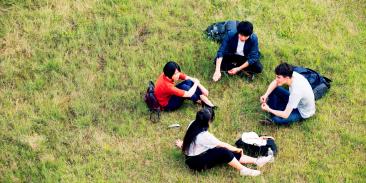Advancing indigenous climate action in the heart of Ecuador's Amazon
It’s not easy to reach the Cofán indigenous community of Dureno in northeastern Ecuador. First you have to travel 15 miles down a winding rural road from the nearest town. Then you have to ask permission to cross a river by boat to reach the reserve.
Dureno’s isolation, in the midst of a great forest, made it a perfect, if somewhat inconvenient, place to hold a workshop for indigenous peoples on climate change. It was there, last month, that the Coordinating Body of the Indigenous Organizations of the Amazon Basin (COICA) held the last in a series of multi-day workshops that focused on the effects of climate change on indigenous communities.
The workshops are part of a larger project funded by the Inter-American Development Bank that counts Environmental Defense Fund (EDF) and Woods Hole Research Center among its partners. The overarching goal is to teach indigenous communities about the effects of climate change and about the ability of a program called REDD+ (Reducing Emissions from Deforestation and Degradation) to help them preserve their tribal lands.
Passing the Torch
EDF’s Chris Meyer, right, working with Tuntiak Katan of the Shuar tribe.
Dylan Murray
The project first began with a week-long ‘train-the-trainers’ workshop in November 2012. EDF’s Chris Meyer was among the experts who trained eight technicians from Ecuador, Colombia, Peru and Brazil, who have in turn held workshops in their own countries over the last seven months to disseminate what they learned. Topics covered in these workshops vary widely: forest carbon measurements, human rights, international climate change negotiations and more. Individuals from hundreds of indigenous communities have now participated.
Victims or Game Changers?
Indigenous groups in the Amazon and elsewhere will be hard hit by climate change. Steve Schwartzman, EDF’s director of tropical forest policy, points out in a recent publication in Philosophical Transactions of the Royal Society B that these communities are often the first to pick up on changes to the climate on the ground. Participants at the Dureno workshop were no exception: they spoke of changing rainfall patterns, shifting agricultural seasons and unpredictable river levels.
But participants in the climate change workshops also learn that their communities possess the tools to help stop deforestation, a major driver of climate change. They can make their voices heard in in national and international discussions on REDD+ and the creation of carbon markets that will compensate them for preserving their forests, providing an economic alternative to logging or clearing forest for agriculture.
You need only look at satellite images of the Cofán territory (image at top) to understand what’s at stake: while surrounding forests have been cleared for small-scale farming in past decades, the Cofán forests remain standing. This pattern of indigenous stewardship is evident throughout the Amazon, but it needs to be supported by economic incentives.
Future of Dureno
There is a reason for Dureno’s inaccessibility: after decades of exploitation by oil companies, loggers and farmers that contaminated their streams and threatened their forests, Cofán leaders sealed off their borders from outsiders. They clearly marked their territory, installed indigenous park rangers, and opted for greater isolation over unsustainable economic pursuits.
REDD+ offers Dureno and countless other communities the chance to be rewarded for their stewardship – ending the false choice between earning a living and conserving the forest. For Dureno, though, this will involve reengaging with the world. Participants at the Dureno workshop said that the Ecuadorian government needed to include them in developing a national REDD+ strategy for the country.
What is true for the Cofán is true for indigenous people throughout the Amazon. REDD+, as a program for fighting climate change by preserving forests, will only work if it serves the needs and aspirations of the people who control those lands. The COICA workshops are an important first step in that direction.










